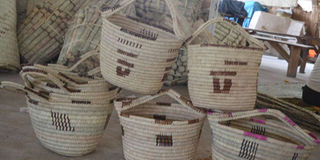Nyeri woman released on Sh2m bond in plastic bag case

Woven bags that are one alternative for plastic bags. The ban on plastic bags in Kenya took effect on August 28, 2017. PHOTO | BARNABAS BII | NATION MEDIA GROUP
What you need to know:
- The ban on plastic bags came into effect on August 28, 2017.
- Alternatives include bags made from sisal, paper, cloth and papyrus.
A Nyeri businesswoman arrested with 17 types of banned plastic bags has been released on a bond of Sh2 million with a surety of a similar amount.
Nancy Wangari Roberts appeared before senior resident magistrate Ruth Kefa and denied violating the Environment Management and Co-ordination Act Cap 387.
ARREST
Ms Wangari, the older sister of former Nyeri governor aspirant Evanson Kinyanjui, was arrested on November 6, 2017 at Mudavadi Market along Gakere Street in Nyeri Town.
The charge sheet indicated that she was the proprietor of a retail shop – Cocorico Polythene Centre.
The court heard that Ms Wangari was found in possession flat and carrier bags, which had been banned under a Gazette notice.
Ms Wangari was arrested by four National Environment Management Authority (Nema) inspectorate officers.
BOND
Her lawyer, Charles Karweru, told the court that she will be available for court proceedings and will not skip hearings.
Mr Kinyanjui stood surety for his sister after. He deposited a copy of his national identity card, a title deed for a 0.574 hectares in Konyu Location, Mathira – valued at Sh8.1 million – and the land’s valuation report.
The case will be mentioned on November 15 to fix the hearing dates.
PLASTIC BAN
The Gazette notices issued by Nema banned the use, manufacture and importation of all plastic bags used for commercial and household packaging and took effect on August 28, this year.
A few exceptions were made, but a person or firm requires special authorisation to access the permitted bags.
Kenyans were urged to embrace alternatives that include bags made from sisal, paper, cloth and papyrus.
Those found flouting the ban risk imprisonment of between one and two years or a fine of between Sh2 million and Sh4 million, or both.





